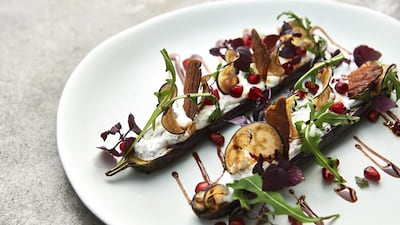You may not have heard the term bistronomy, but the culinary movement has revolutionised French dining, and could do the same for the UAE.
A portmanteau of “bistro” and “gastronomy”, the term – spelt bistronomie in France – was coined in 2004 by food critic Sébastien Demorand while reviewing La Régalade, a small bistro that was opened by Yves Camdeborde.
Camdeborde had previously worked in places such as Ritz and Tour d’Argent, but had decided to take his skills and use them not in another swanky restaurant but a small bistro. It was a revelation.
These days, Demorand runs Le Comptoir du Relais, a 20-seat bistro on the Left Bank in Paris that is free of pretence, but serves high-end French comfort food at an affordable price.
Parisian restaurants had built a reputation for being somewhat serious and buttoned-up. The new movement offered a more laid-back approach, with a personal touch.
The traditional formality from classically trained chefs was giving way to something more hassle-free. It was something that was much needed in Paris.
Rather than having menus that never changed, they were now changing daily depending on what local ingredients were available. Gone were the dress codes, traditional white tablecloths and light classical music, and in came mismatched furniture and livelier tunes.
But crucially, the food was of a higher standard than bistros had served before.
Now it has come to Dubai, thanks to French chef Udo Moreau. His credentials are impeccable, having launched the iconic Joël Robuchon in Paris and London and worked at eight other Michelin-starred restaurants. He has now opened Molecule at D3 Design District, based on the bistronomy movement in Paris.
“It is something Dubai needs for sure,” Moreau says. “I think people are just a bit fed up of having to pay Dh1,000 for a meal – value for money is something that we all need to consider more now in Dubai.
“In my experience, what people want is good seasonal food on the plate, good atmosphere and an enjoyable time, but also at an affordable price.”
Dishes at Molecule are French, with a global influence. They include yellowfin tuna tartare (Dh53), carrot and goats cheese gazpacho (Dh34), Chilean sea bass with lemon and capers (Dh96), salmon with roasted sesame (Dh60), lamb rack with roasted sage (Dh64) and aubergine with labneh and pomegranate (Dh38). The likes of crème brulee (Dh30) and mille-feuille (Dh25) feature on the list of desserts.
Nothing is overly fussy, but everything is of a standard that you would expect from a chef who has worked in a restaurant such as Joël Robuchon.
Like many others before him, Moreau turned his back on the world of Michelin to undertake this venture.
“I left because you’re always under pressure all the time,” he says.
“Every day, you think there’s an inspector in the room and it is hard, so I wanted to bring my skills and knowledge of 20 years working in Michelin restaurants to create fresh, seasonal food that represents value for money.”
Molecule seats only 55 people, but it is a creatively designed space that reflects the fact it is in the design district. It even has its own eclectic-music station playing in the restaurant and streaming online through their website, and the multinational staff wear Adidas rather than brogues.
In France, the move towards bistronomy arose as a necessity. The book Au Revoir to All That: Food, Wine, and the End of France by Michael Steinberger – published in 2009 – highlighted the fact that bistros had stopped innovating and were closing at a staggering rate of about two a day.
From the start of the 1960s, when there were 200,000 in France, only 30,000 remain. Dubai take note. While bistronomy is ultimately just a label, the idea – and more importantly the spirit behind it – is something that fits with what Dubai might well need right now.
Just like the French discovered a lot of their bistros were closing, Dubai diners are increasingly eating in places that are often less than half full – and in some cases, notice that their table is the only one being served for most of the evening. This is rarely a reflection on the quality of the food, more a result of an oversaturation of the big, highly-priced restaurants in the city.
At a time when the UAE is anticipating the possible arrival of the Michelin guide, the biggest shift in dining could well come from the ideals of bistronomy – a movement that rejects many of the values of the famous dining guidebook while maintaining the quality of food.
Paris is still thriving and creative, of course. But while the likes of Pierre Gagnaire and Guy Savoy continue to serve up incredible food in three Michelin-starred restaurants, there are also brilliant chefs running little bistros with lively atmospheres and menus bursting with quality dishes at much less astronomical prices.
A relaxed setting, quality food and reasonable prices. This is not a new idea, but in 2017, it could be a revolutionary one in Dubai, and the first culinary shot might just have been fired at Molecule.
artslife@thenational.ae

